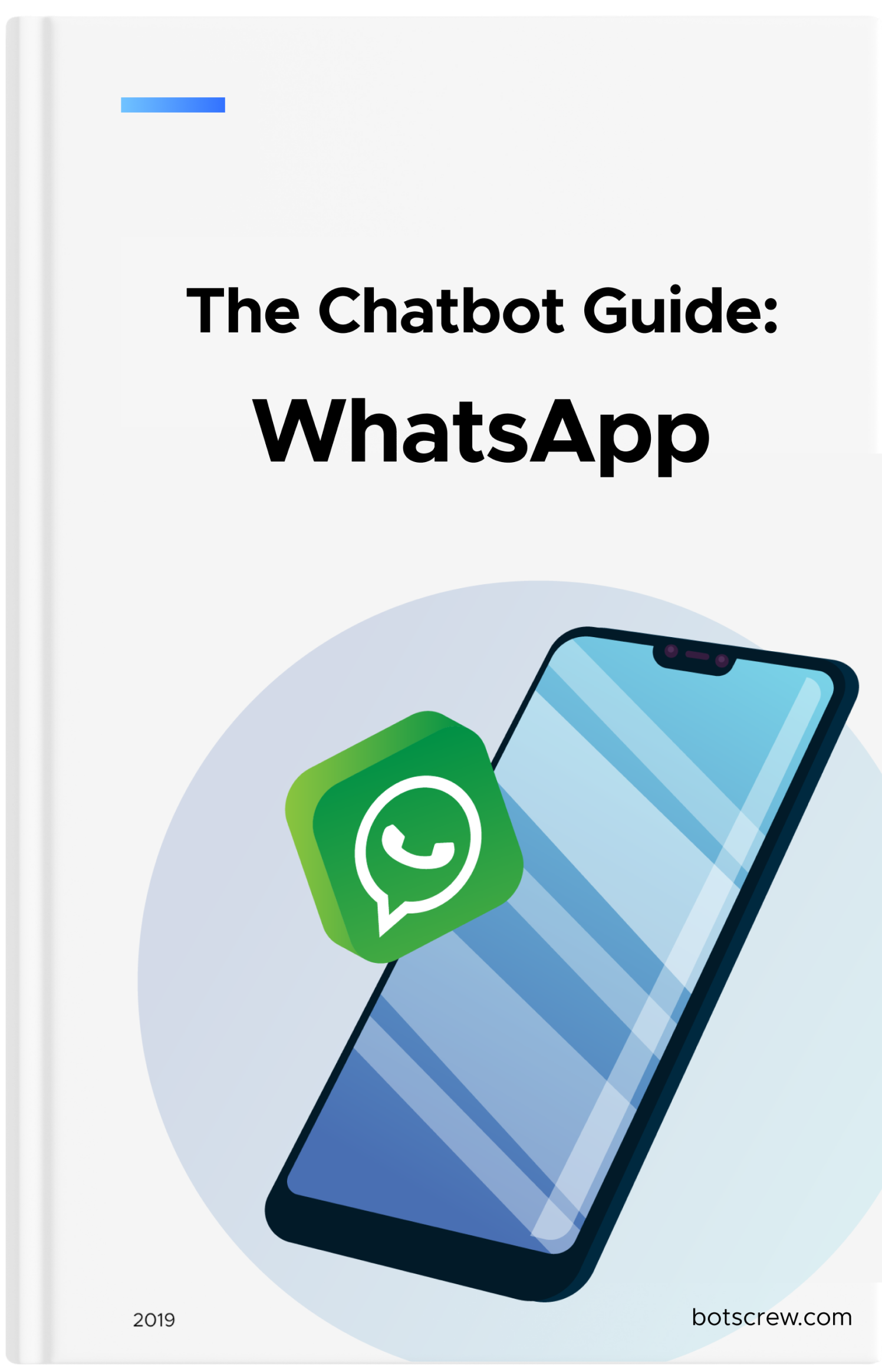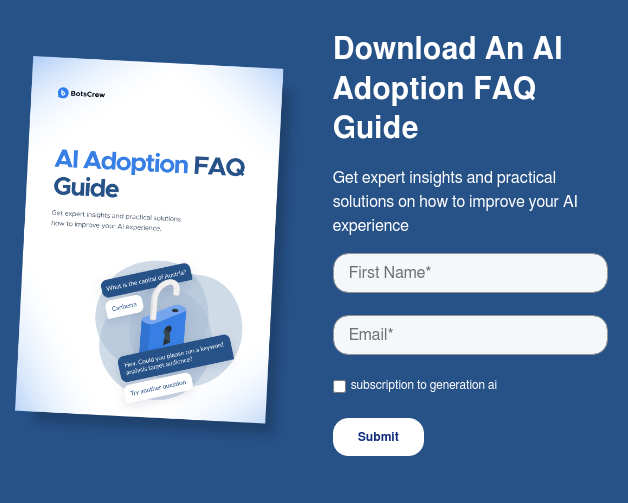Is ChatGPT HIPAA Compliant? Privacy Concerns With Conversational AI in Healthcare
Although chatbots are popping up everywhere, it's crucial to balance risks and rewards with ChatGPT or custom chatbot solutions. Is ChatGPT HIPAA compliant? We've shared everything you need to know before diving into HIPAA-compliant ChatGPT usage in our detailed guide.
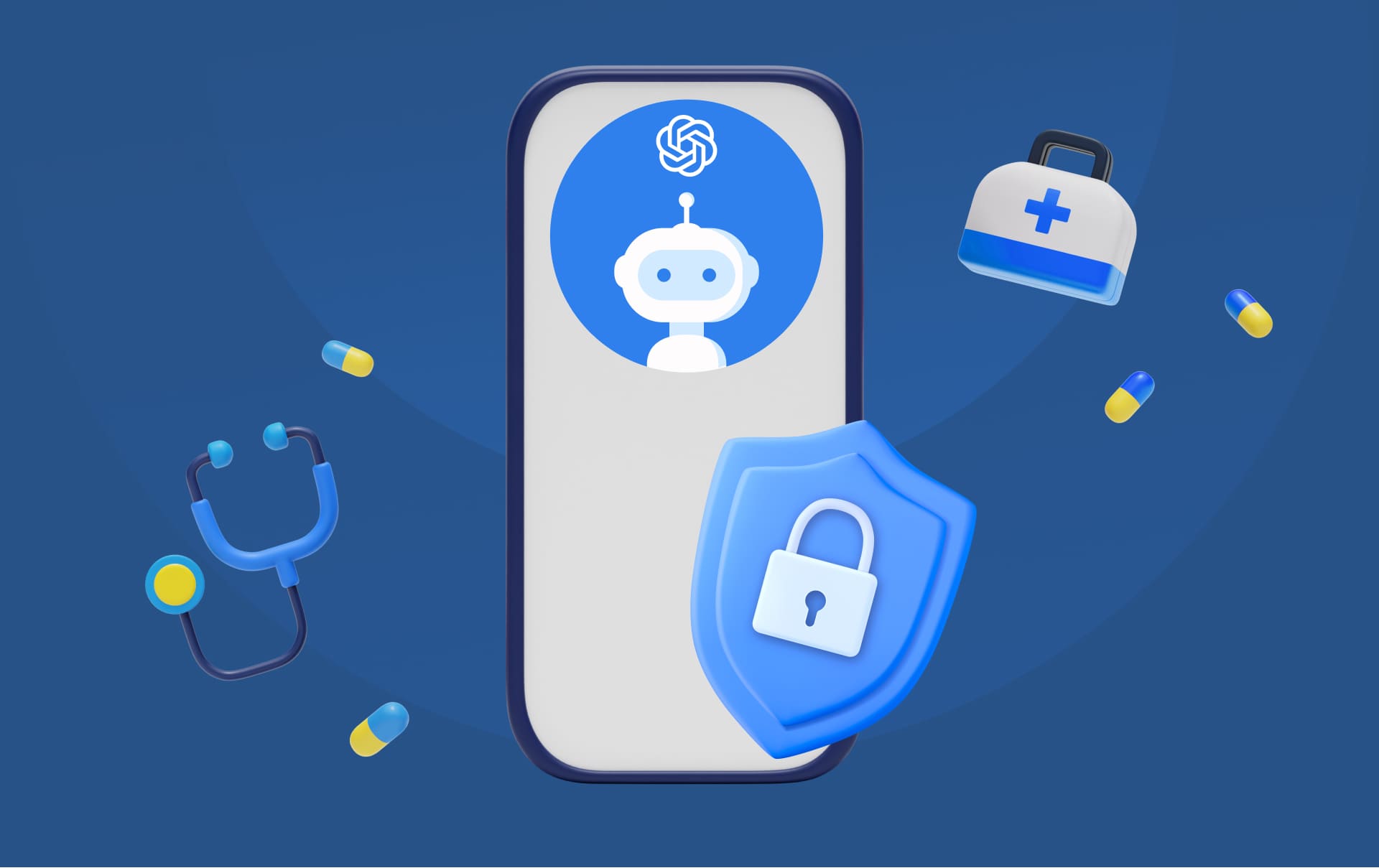
Each year, more healthcare providers strive to enhance patient experiences, making them faster and more efficient. AI chatbots, alongside technologies like ChatGPT, are becoming indispensable in this quest.
Managing medications, wellness programs, gathering the info on a person's symptoms, and offering solutions for minor medical issues — these are some of scenarios where chatbots can step in and alleviate the burden on medical professionals. In fact, the healthcare industry is rapidly embracing chatbot technology, with the market projected to soar to $3.62 billion by 2030.
However, this progress prompts a critical question: is ChatGPT HIPAA compliant? How can healthcare businesses ensure robust data security and develop a HIPAA-compliant chatbot? To address this, we've compiled essential tips for companies on how to leverage conversational AI both effectively and securely.
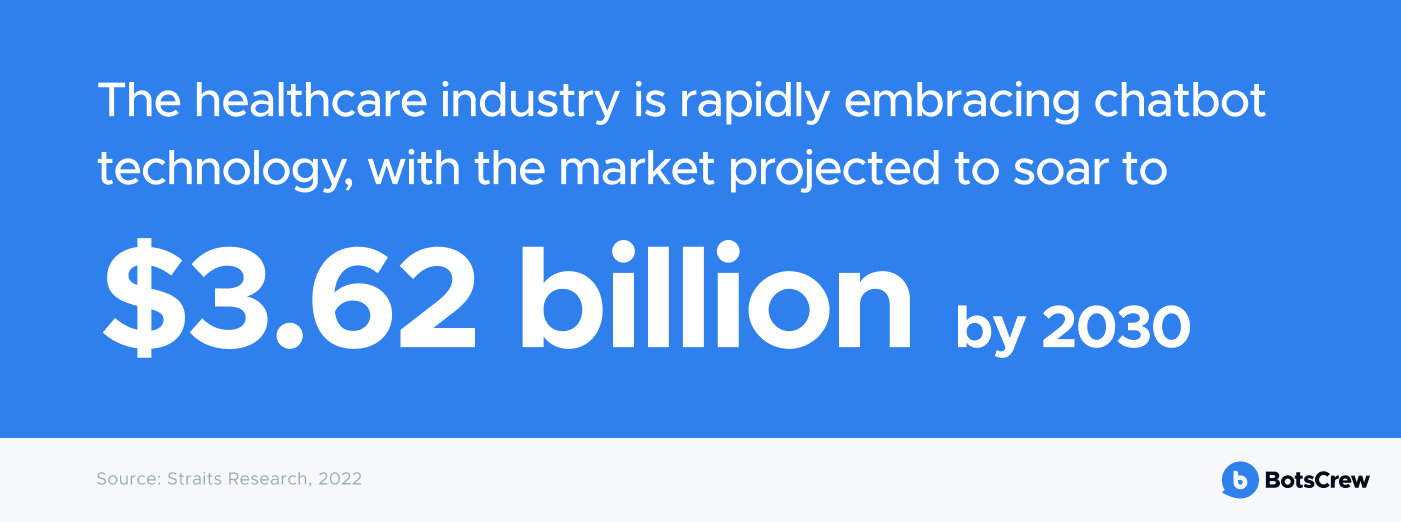
The Impact of AI and ChatGPT on Diagnosis, Treatment, and Overall Efficiency
AI and ChatGPT are transforming the healthcare landscape by improving patient care, optimizing administrative workflows, and enabling pioneering research. This technology is poised to revolutionize diagnosis and treatment, leading to enhanced efficiency and better outcomes across the industry.
High-Effective Virtual Assistant for Administrative Work
Healthcare specialists often face tons of work while managing the case files and reports of the patients. According to the "State of Automation 2022 Report," a national survey of 1,000 American healthcare professionals revealed that, on average, staff spend 57.5% of their time on repetitive tasks such as data entry and documentation.
At the same time, 77% of surveyed call agents report using chatbots to automate routine, time-consuming, and overly repetitive tasks, freeing them up to tackle more complex challenges. For instance, before the patient's visit, an AI-based chatbot can:
- Make appointments;
- Answer popular patient questions;
- Inform about the visit;
- Send reminders
Interesting-to-know: a single missed appointment can set a medical practice back an average of $200. Reduce patient no-shows by automating scheduling and appointment reminders. Send alerts for medication schedules, physical therapy sessions, and upcoming routine check-ups to keep patients on track.
- Collect symptoms and initial requests;
- Build conversations for better pre-visit analysis, and more.
That is a whole new story for medical professionals that used to do everything manually. Furthermore, with additional training, a bot can perform advanced tasks such as generating pre-diagnosis summaries.
But that is not the end for chatbot applications. During and after the patient's visit, an AI-based chatbot can:
- Complete medical stories;
- Refill prescriptions;
- Schedule the next appointments;
- Support patients with minor requests;
- Provide personalized therapeutic experience.
In therapeutic practice, chatbots can be invaluable allies for medical staff in patient monitoring and remote care, especially for clients needing extended at-home monitoring.
For example, a Vik chatbot is designed to support breast cancer patients. It engages with patients about their condition, alleviates their anxieties and fears, and provides timely prescription reminders. This virtual companion has significantly boosted medication adherence rates and achieved an overall satisfaction rate of 93.95%.
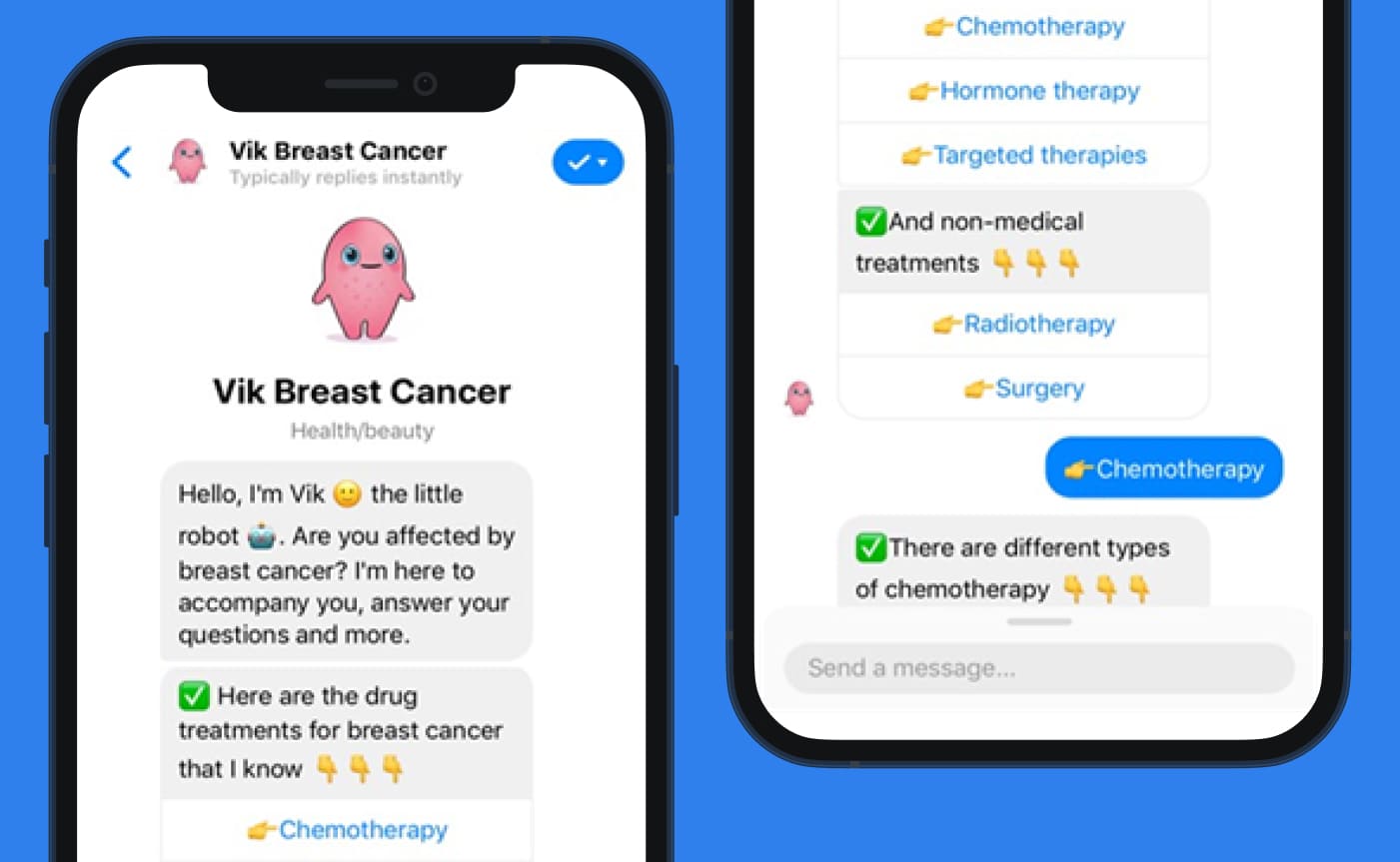
Another compelling example is Melody, a chatbot developed by a Chinese company equipped with neural networks and trained on medical textbooks, records, and real conversations between patients and doctors.
It continuously asks questions to collect more data, which is compared against its extensive database of medical knowledge. This process allows Melody to compile symptoms and potential diagnoses, which are then sent to a doctor for review, enabling them to recommend the next steps with better precision. The chatbot offers access to 600,000 doctors.
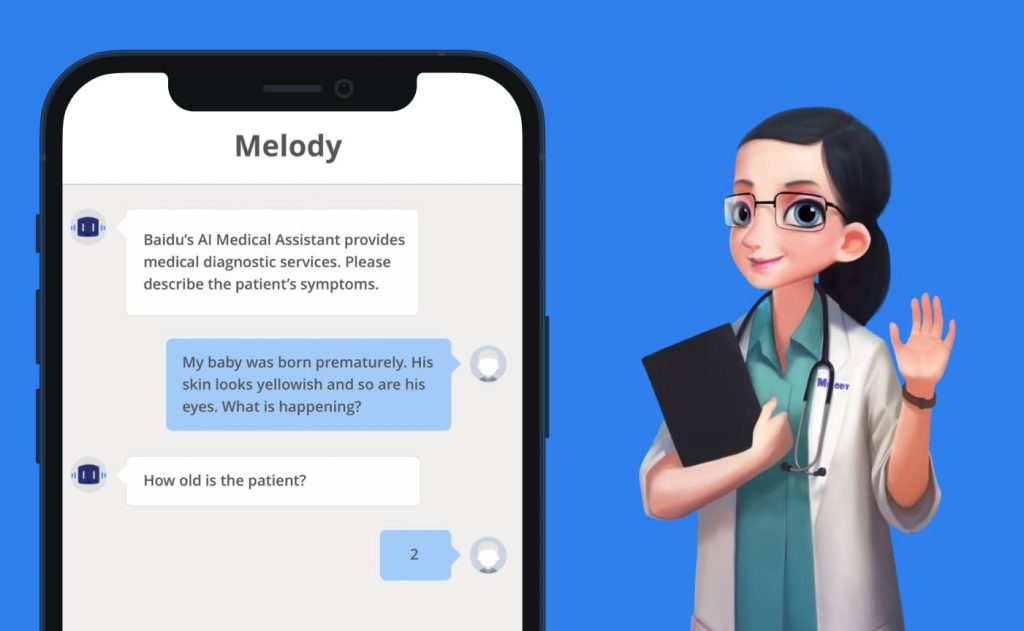
It is the time to embrace the power of AI! Enhance patient experience, boost engagement, and streamline routine tasks with a custom AI chatbot.
Patient's Personal Nurse & Advisor
In a survey of over 300 clinical leaders and healthcare executives, more than 70% reported that less than 50% of patients are actively engaged. This isn't a surprise since long wait times are driving patients away, with almost 30% abandoning appointments and 20% switching providers for good.
Additionally, lagging service, intricate forms, and unapproachable contact methods contribute to a subpar patient experience and low engagement. A chatbot can serve as an invaluable informer and assistant for patients. Say goodbye to long wait times for replies or appointment bookings!
From the patient's perspective, many chatbots are designed for symptom screening and self-diagnosis. For instance, Quro, an automated chatbot by Quro Medical, Inc., delivers preliminary diagnoses based on symptoms and medical history. It predicts user conditions with an average precision of approximately 0.82.
Neva chatbot guides and educates patients about genetic testing, providing reliable information quickly and conveniently. It also sends detailed explanations of test results and allows patients to book meetings with genetic counselors. Shortly after the launch, Neva has engaged in over 1,000 chats, boasting a success rate of over 65%, indicating that the majority of patients who start interacting with the bot complete the entire chatbot flow.
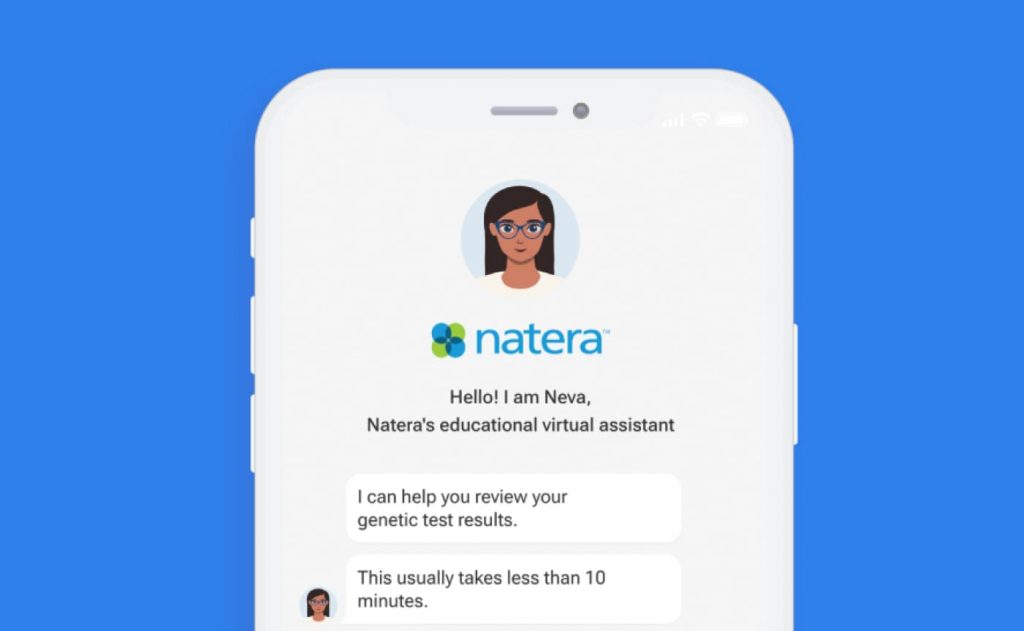
Moreover, chatbots are entering the territory of humans: empathy, feelings, and mental health support. Do you need support when you feel lonely? Feeling overwhelmed and needing good advice on how to reduce the level of stress? Chatbots like Ginger can help you out.
The chatbot provides on-demand mental health support through AI-driven chatbots and virtual consultations with human therapists. 85% of members of Ginger's clinical expertise together with Headspace's meditations with moderate to severe depression see symptom improvement after 6–16 weeks. 83% of members with moderate to severe anxiety see symptom improvement after 6–16 weeks.
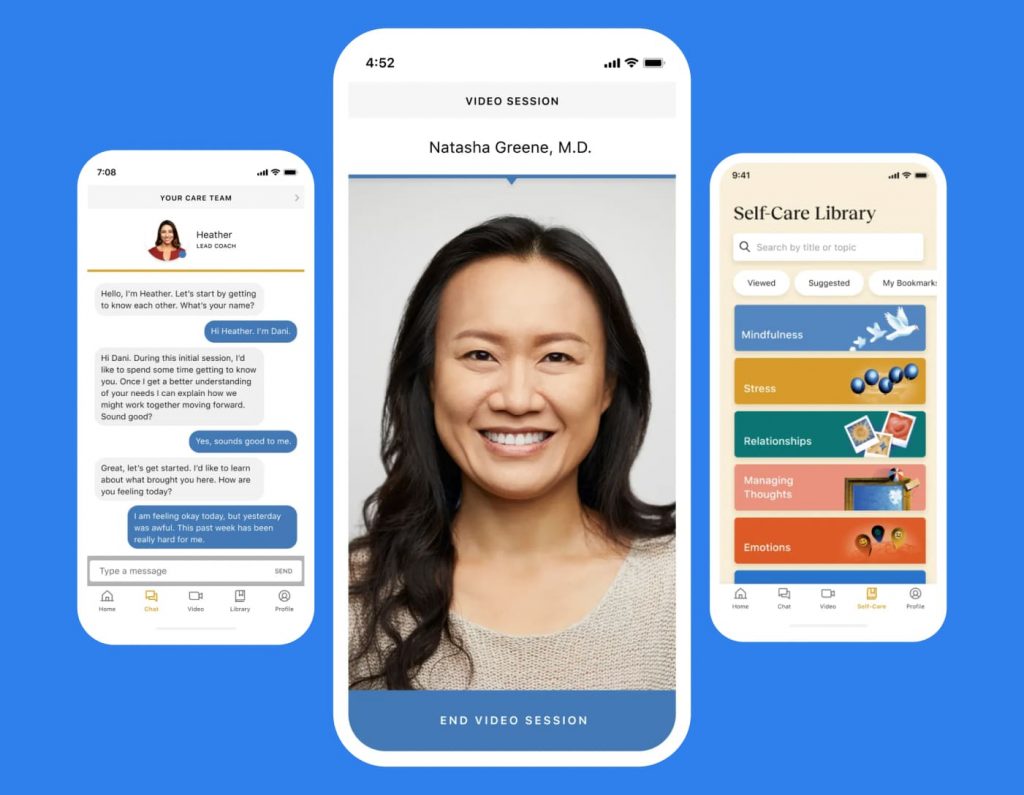
From casual catch-ups to workplace meetings, many aspects of our lives have recently shifted to video calls. This new normal in communication means your patients will now expect voice and video capabilities in your HIPAA-compliant chat platform. These features facilitate more engaging telehealth visits and enable personalized face-to-face communication, which aids in diagnosis.
A survey conducted by Massachusetts General Hospital revealed that 83% of patients found telehealth services to be as good as or better than in-person visits, with engaging voice and video experiences significantly contributing to their positive perceptions. AI plays a pivotal role in this context by automating patient encounters, enhancing diagnostic accuracy, and streamlining various other processes.
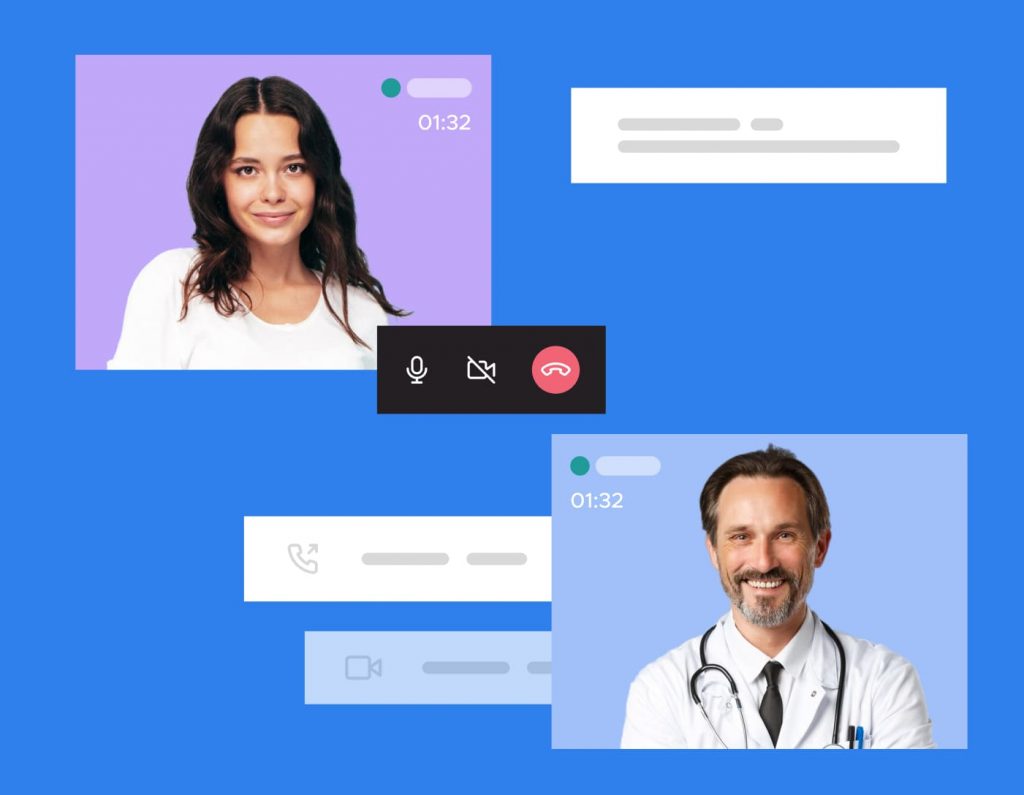
This highlights the promising future of chatbots in healthcare and underscores the broad scope of their potential to assist both patients and physicians.
Meet HIPAA: Regulation in Healthcare That Is Worth To Keep In Mind
Although it might seem obvious that adhering to HIPAA compliant ChatGPT and other software requirements is crucial for all organizations in the healthcare industry regulated by HIPAA legislation, even the largest businesses can falter.
😮 Anthem, the biggest insurance market player in the US, learned this the hard way. They had to pay $115 million in settlement fees and invest an additional $260 million into upgrading their cybersecurity infrastructure. This all stemmed from a phishing email, which led to one of the largest PHI data breaches in US history, compromising nearly 80 million health data records.
✍🏻 HIPAA PHI, or Protected Health Information (PHI), encompasses any details within medical records or designated record sets that can identify an individual. This includes information created, used, or disclosed during healthcare services like diagnosis or treatment.
If your business handles patients' Personal Health Information (PHI), you'll want to avoid such disastrous outcomes. The only way to ensure this is by meeting data security requirements when designing and building your HIPAA-compliant software.
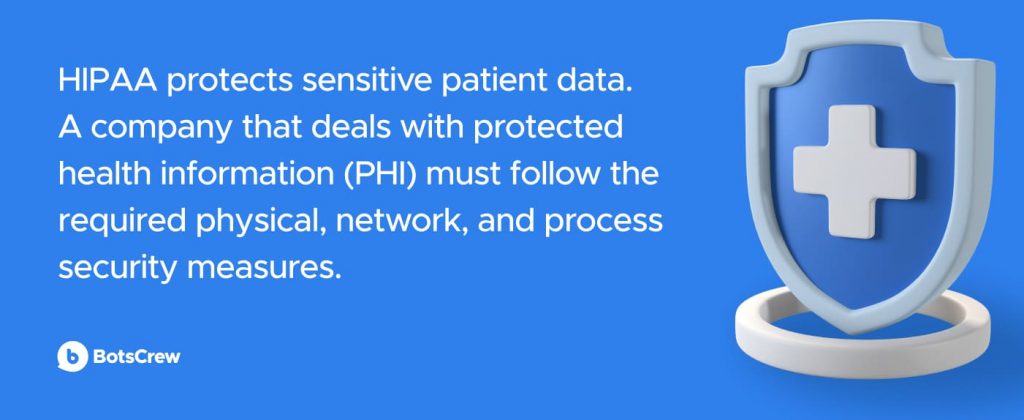
Additionally, it's crucial to thoroughly understand all requirements to avoid non-compliance fines, which can be as high as $50,000 per violation.
How to Ensure You Use a HIPAA-Compliant ChatGPT or Other Custom Healthcare Chatbots
Interested in delving deeper into HIPAA-compliant ChatGPT? Here are a few useful guides, each complete with checklists:
Who Needs To Be HIPAA-Compliant (And What Your Business May Benefit From It)?
Any entity handling protected health information (PHI) must comply with HIPAA regulations. Covered entities encompass healthcare providers like doctors, nurses, clinics, hospitals, pharmacies, and nursing homes. Additionally, health insurance companies, healthcare clearinghouses, IT vendors, cloud service providers, and other business associates that manage PHI on behalf of covered entities must also adhere to HIPAA standards.
The key benefits that come along with a HIPAA-compliant ChatGPT/custom chatbot include:
Prevents Misuse
Medical information is among the most sensitive data a person possesses. Even when sharing it with reputable medical practitioners, there is always a risk of data leaks. In fact, data breaches exposed at least 41 million records between March 2021 and February 2022 alone. HIPAA ensures that only authorized personnel can access person's data, preventing a chatbot from casually sharing, for example, a user's allergy list with a marketing firm.
Fosters Trust
Under certain circumstances, chatbots are considered covered entities, and HIPAA provides a legal framework with clear guidelines on how these chatbots can handle Protected Health Information (PHI). Sharing PHI requires a significant level of trust, and with a HIPAA-compliant chatbot, this trust is inherently established. Companies must obtain a person's informed consent and secure his/her information with robust encryption to access his/her PHI.
Ensure Legal Compliance
Non-HIPAA-compliant healthcare chatbots are not an option if a company intends to provide medical services in the US. Strict laws protect PHI from potential misuse, and violating HIPAA regulations can result in heavy penalties and legal repercussions.
According to a survey by the National Library of Medicine, only 29% of US healthcare organizations reported being 76–100% compliant with HIPAA rules. This indicates significant room for improvement, and ensuring that a corporate healthcare chatbot is HIPAA-compliant is a critical step forward.
Sense of Security and Control
HIPAA empowers users to decide who has access to your PHI. A person can review past interactions with the company's chatbot, request corrections, and limit access to his/her data. This level of control over user's information fosters a sense of security, facilitating better communication with healthcare professionals and leading to more accurate diagnoses.
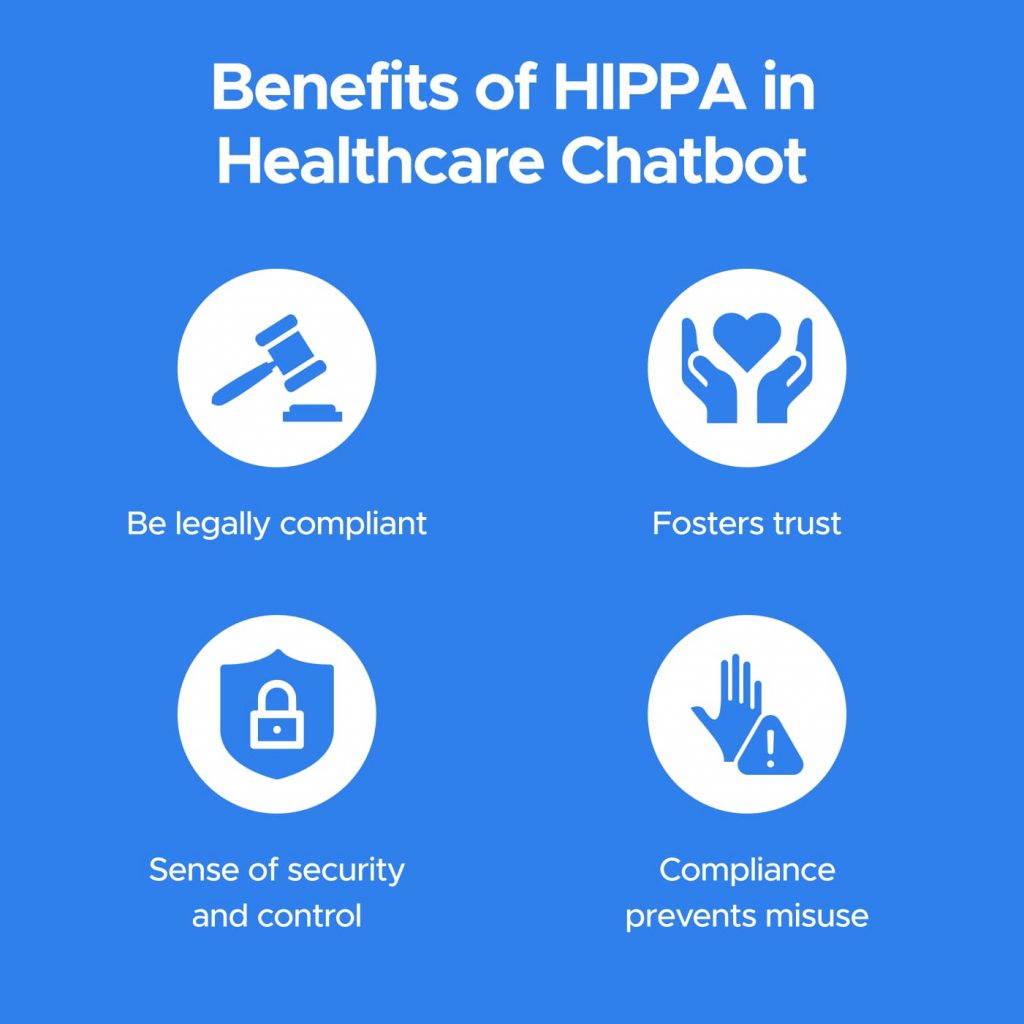
ChatGPT in Healthcare: Current HIPAA Compliance Status
ChatGPT by OpenAI, along with other AI chatbots and Generative AI development services, holds immense promise for revolutionizing healthcare with its sophisticated language processing abilities. However, deploying it in healthcare settings brings a host of challenges and limitations, especially concerning HIPAA compliance.
ChatGPT isn't inherently HIPAA-compliant. To achieve HIPAA compliance, a technology or service must implement rigorous safeguards to protect the confidentiality, integrity, and availability of protected health information (PHI). OpenAI hasn't marketed ChatGPT as a HIPAA-compliant tool as well.
To be considered for HIPAA-compliant applications, ChatGPT must be deployed in an environment that meets stringent security requirements. Additionally, OpenAI needs to offer firm guarantees on data handling practices, ensuring data is securely stored, not improperly shared, and strictly used for its intended purpose.
According to OpenAI, they can sign Business Associate Agreements (BAA) "in support of customers' compliance with the Health Insurance Portability and Accountability Act (HIPAA)."
✍🏻 BAA, or a Business Associate Agreement (BAA), creates a legally binding relationship between HIPAA-covered entities and business associates, ensuring the full protection of Protected Health Information (PHI). This agreement is essential when business associates might have access to PHI during their operations.
More details are available via link:
How can you adhere to standards and ensure HIPAA compliance while developing a chatbot? Let's dive into the HIPAA-compliant ChatGPT/compliance software checklist.
How to Ensure HIPAA Compliance When Using ChatGPT
Ensuring HIPAA compliance when integrating GPT in healthcare requires a comprehensive strategy that includes implementing robust security measures, establishing clear policies, and fostering collaboration between healthcare providers and AI developers. Here are the essential steps to achieve HIPAA compliance.
✅ All HIPAA-covered entities must perform regular self-audits using a specific checklist to provide an in-depth analysis of the current compliance landscape, identify possible risks, and suggest improvements. The software you plan to use must facilitate the generation and management of these reports.
✅ Once you've identified compliance vulnerabilities, prepare a Remediation Plan to address these flaws. This might involve replacing certain systems or custom-modifying others to ensure PHI data security. Your software should enable the creation and monitoring of such plans based on the self-audit reports.
✅ Encrypt all data in transit and at rest to ensure that any PHI processed by ChatGPT remains secure and protected from unauthorized access.
✅ Implement robust user authentication mechanisms to ensure only authorized employees can access the AI system.
✅ Use role-based access controls to restrict access to PHI based on the user's role within the organization.
✅ Before inputting data into ChatGPT, ensure that all PHI is de-identified according to HIPAA standards by removing any information that could be used to re-identify an individual.
✅ Establish a Business Associate Agreement (BAA) with OpenAI or any third-party service provider involved in processing PHI. This agreement should outline the responsibilities of both parties in protecting PHI and ensuring HIPAA compliance.
✅ Consider deploying ChatGPT in a secure, controlled environment, such as on-premises servers or a private cloud that meets HIPAA security standards.
✅ Implement secure document storage and management so your staff can readily access any information during unexpected audits.
✅ Incorporate incident management features. Your software should include a built-in incident reporting and tracking system to provide a clear view of daily HIPAA compliance issues. Automated breach alerting, ticket creation, and OCR notifications can help prevent unwanted fines.
✅ Appoint a HIPAA Compliance Officer & train your personnel. Training your employees is crucial to ensuring compliance, and your software should support the oversight of training for every user role.
How Do We Ensure HIPAA Compliance On Our Projects
Finally, we are thrilled to announce that we proudly served as IT vendors for one of the biggest global healthcare service providers. According to our agreement:
- Chatbot enterprise platform is fully deployed to the client's infrastructure under their regulations.
- BotsCrew ensures that we have no production access to any resources where PHI might be stored, such as production databases, chatbot platforms (containing patient conversation histories), or any other assets that could potentially violate PHI data (including AWS console access and production credentials in the server, among others).
- We ensure PHI data never leaks into logs under any circumstances. To ensure this, our development team masks PHI in the logs, which may be used for debugging purposes.
- Any system that can have PHI limits access to PHI from outside the US. This is a requirement.
- The development team utilizes a production database dump with stripped PHI for testing purposes. The PHI stripping process is conducted by a client's employee (Developer) who has been trained in HIPAA compliance.
- Sharing any patient information that may include PHI — such as results, account information, or any other patient identifiers — in communication streams (like Slack channels) is strictly prohibited.
- It is forbidden to use/misuse any patient information that got to us accidentally.
Why Collaborate With BotsCrew?
From idea to integration into clinical workflows — BotsCrew speeds up the journey from development to deployment of HIPAA compliant health chatbot solutions.
1 — We offer comprehensive chatbot development services, covering everything from initial discovery and proof of concept (POC) to minimum viable product (MVP) delivery. You bring the idea; we bring it to life.
2 — Faster time to market or automation in healthcare with a reliable team to operationalize a solution and take it to market quickly.
3 — Best-in-class technical framework and efficient integration into clinical workflows. Furthermore, we build complex chatbots powered by AI, ML, and NLP.
4 — IT security and privacy protocols, compliant with regulatory standards. We can employ robust encryption protocols such as Transport Layer Security (TLS), or Secure Sockets Layer (SSL).
5 — We ensure the chatbot's infrastructure and hosting environment are created with strong security measures.
6 — We can sign a Business Associate Agreement (BAA), a legally binding contract that regulates the use and protection of PHI. This agreement between a covered entity (such as a healthcare provider) and us as a business associate (chatbot provider) ensures that our company is fully aware of its HIPAA obligations and provides assurances that PHI will be handled in a compliant and secure manner.
7 — Specialized insights and guidance from BotsCrew experts with implementation experience.
BotsCrew excels in crafting healthcare-centric, GPT-powered chatbots that adhere to HIPAA regulations, expertly handling sensitive health and medical data. With our solutions, you can fast-track your journey quicker than ever before!
The bitter truth: crafting a chatbot from scratch is no small feat, especially for those with little to no experience. But fear not! With over 7 years of expertise in developing secure, HIPAA-compliant projects, we're here to transform your chatbot vision into reality with ease and efficiency.




